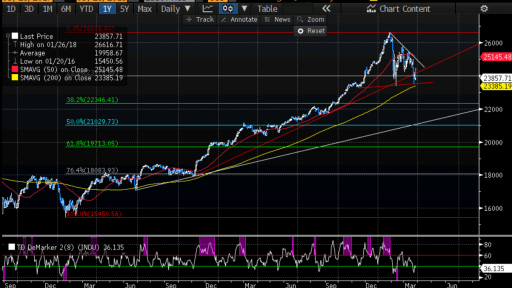- Home
- >
- Stocks Daily Forecasts
- >
- The Dow may already be in a bear market — how long it could last

The Dow may already be in a bear market — how long it could last

The Dow Jones Industrial Average surged 670 points on Monday, but it will hit bottom on Mar. 4, 2019, at 18,328.27.
That’s on the assumption that a major bear market began at the Jan. 26 highs, and that the ensuing bear market will be average both in terms of length and loss.
That would mean we face 11 more months of a declining market, in which the Dow (^DJI) will drop another 5,205 points (or 22.1%) from its Jan. 26 peak.
Of course, we don’t know yet whether we’re in a major bear market. The Dow’s impressive rally on Monday surely is letting the bulls breathe a little more easily, since last Friday the Dow Theory, the oldest stock-market timing system in widespread use today, came within a hair’s breadth of issuing a major bear market signal.
Even after Monday’s surge, we’re not out of the woods, since last week’s decline called into serious question the idea that the bull market is alive and well after surviving its late-January/early-February correction. So it’s important to face squarely what investors will be up against if indeed a bear market started at the late-January highs.
Your reaction depends a lot on whether you see the glass as half-full or half-empty. A bear market would undoubtedly be painful for many, if not most, of us — and excruciating for some. Yet such a decline would still leave the Dow almost exactly where it closed on Election Day in 2016. Given the many doom-and-gloom predictions made then about the impact of a Donald Trump presidency, some may feel lucky that an average bear market would leave them no worse off than where they stood on that November day.
To be sure, you might worry that we are due for a larger-than-average decline, given the length and gains of the bull market that began in March 2009. But history does not support such a concern: There is no statistically significant correlation between a bull market’s length or gain and the subsequent bear market’s length or loss. So while a bigger- or longer-than-average bear market is certainly possible, it will be for reasons other the mere strength of the preceding bull market.
Source: Bloomberg Pro Terminal
 Trader Aleksandar Kumanov
Trader Aleksandar Kumanov Read more:
If you think, we can improve that section,
please comment. Your oppinion is imortant for us.











